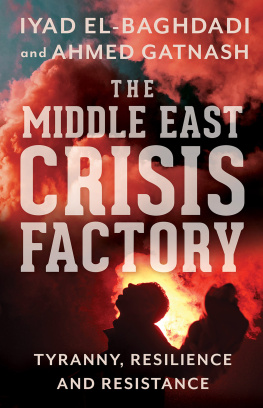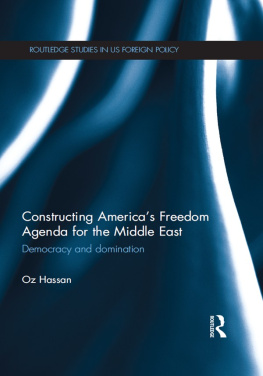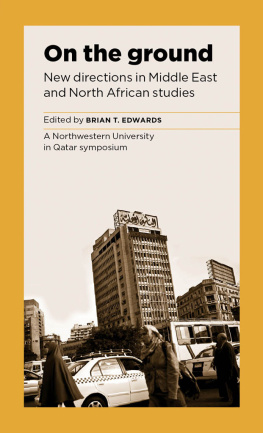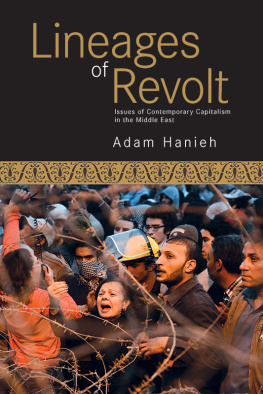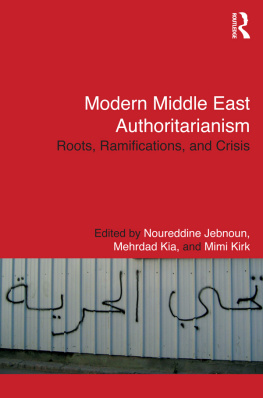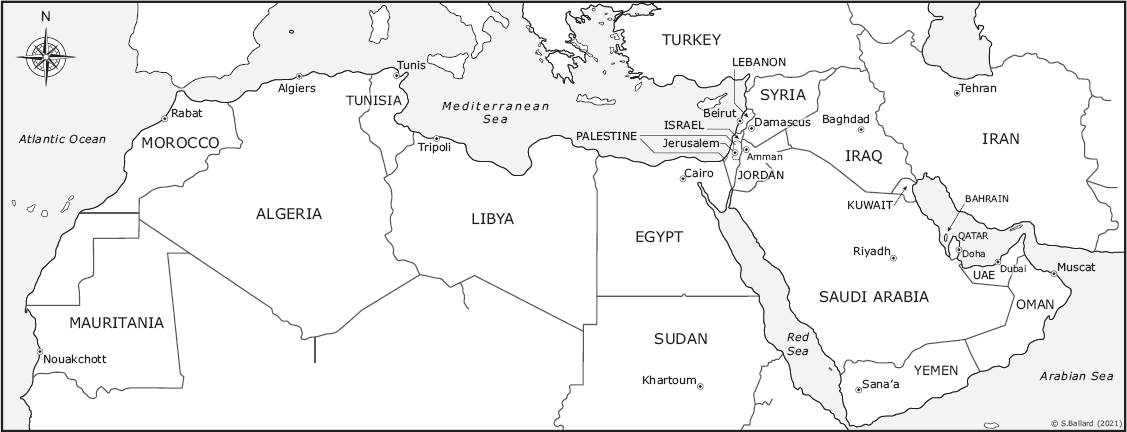Contents
Page List
Guide
A critical compass for all to rethink the Middle East as it is, and reimagine what it could be. This is an ambitious charter to realign history and inspire hope for a new generation, and generations to come.
Lyse Doucet, Chief International Correspondent, BBC News
A passionate and accurate analysis of the past and future of the Middle East, showing that while tyranny persists after the 2011 uprisings, there is also resilience and resistance. Offering a sound, creative path away from devastating Western military intervention, this is a loud cry for profound transformation by two prominent activists of the region.
Madawi Al-Rasheed, Fellow of the British Academy, Visiting Professor at the LSE Middle East Centre, and author of The Son King
A rare genuine effort to provide an objective yet impassioned analysis of the Middle East from inside the region. From 9/11 to the Arab Spring to ISIS and countless ill-conceived foreign interventions, this book is essential reading for understanding the cycle of violence and tyrannyand for breaking that cycle.
Garry Kasparov, Chairman of the Human Rights Foundation and the Renew Democracy Initiative
It is a tribute to Iyad El-Baghdadi and Ahmed Gatnash that this book makes just as uncomfortable reading for Western politicians and policymakers as it would for the Middle Easts tyrants and terrorists. A brave, unflinching analysis of a region bedevilled by crises, written not by another Western expert but by two compelling Arab voices.
Justin Marozzi, author of Islamic Empires: Fifteen Cities that Define a Civilisation
Anyone who wants to understand the traumas of the contemporary Middle East, and is willing to learn how deeply implicated in them the West is, must read this book.
Peter Beinart, author of The Crisis of Zionism
It took me a lifetime to try to understand why the region where I was born and raised is a crisis factory. This book is a genuine guide, full of important information, accurate context and honest hope for those who want to understand the Middle East.
Ghada Oueiss, Principal Presenter, Al Jazeera Arabic
An astute geopolitical analysis that is also deeply heartfelt. The authors discussion of tyranny, terrorism and foreign intervention in the Middle East is well researched and unsparing; their personal stories and hopes for the future (complete with practical suggestions) make it stand out.
Sarah Kendzior, author of Hiding in Plain Sight and The View from Flyover Country
After decades of the West aiding and abetting authoritarianism across the Middle East, on 6 January 2021, a white supremacist mob attacked the seat of US democracy, aiming to install a dictator. In The Middle East Crisis Factory, two prominent activists sound the alarm that authoritarianism anywhere is a threat to democracy everywhere.
Rula Jebreal, award-winning author and journalist
THE MIDDLE EAST CRISIS FACTORY
IYAD EL-BAGHDADI
AHMED GATNASH
The Middle East Crisis Factory
Tyranny, Resilience and Resistance
HURST & COMPANY, LONDON
First published in the United Kingdom in 2021 by
C. Hurst & Co. (Publishers) Ltd.,
83 Torbay Road, London NW6 7DT
Iyad El-Baghdadi and Ahmed Gatnash, 2021
All rights reserved.
Printed in the United Kingdom
Distributed in the United States, Canada and Latin America by
Oxford University Press, 198 Madison Avenue, New York, NY 10016,
United States of America.
The right of Iyad El-Baghdadi and Ahmed Gatnash to be identified as the authors of this publication is asserted by them in accordance with the Copyright, Designs and Patents Act, 1988.
A Cataloguing-in-Publication data record for this book is available from the British Library.
ISBN: 9781787383043
This book is printed using paper from registered sustainable and managed sources.
www.hurstpublishers.com
To Bassem, Jamal, Raed, and all our fallen heroes:
We will never forget
We will never forgive
And we will never stop fighting.
We fight for everyone
Nobody gets left behind
Were not free until were all free
And were not safe until were all safe.
CONTENTS
Iyad El-Baghdadi
PART I
HISTORY
PART II
HORIZONS
FOREWORD
Iyad El-Baghdadi
I did not expect this to be my first book.
* * *
On 17 December 2010, Mohamed Bouazizi, a young Tunisian street vendor, set himself on fire in a final act of protest against a life of daily humiliation and despair under a dictatorial regime. Within weeks, a fire had spread across the entire Arabic-speaking world, inspiring protests and defiance from a generation that had known nothing but tyranny, many having lived under the same ruler their entire lives. Over the next few months, the Arab Springas it came to be calledtransformed my life, imbuing me with a sense of determination and responsibility.
I was then a thirty-three-year-old start-up consultant, born to Palestinian parents but raised in the United Arab Emirates. My friend and co-writer, Ahmed Gatnash, was a nineteen-year-old student watching his parents country, Libya, erupt into revolution from afar, having been born and raised in the United Kingdom. The uprisings made life seem more hopeful and more purposeful, as if a historical window of opportunity had opened. When we started talking online in 2012, I told Ahmed that I was writing a manifesto in which I hoped to introduce a kind of left-libertarianism that I called Islamic libertarianism. That, I thought, would be my first book.
The window of opportunity wasnt open for long. The dictators would soon deliver a heavy blow to our revolutions momentum, working to re-establish a status quo in which revolution was impossible and the people were forever subdued. Classical Arab powers such as Egypt fell to the status of mere vassals, as a new regional order arose, dominated by a counter-revolutionary axis with Riyadh and Abu Dhabi at its centre. Saudi Crown Prince Mohammad bin Salman, known by the initials MBS, quickly became the poster boy of this new phase of our regions history.
But the heyday of the counter-revolution didnt last forever, either. It too came to an end, and that transition brings its own painful memories. Trumps election in 2016 gave the counter-revolutionary axis an enormous boost; the worlds most powerful country was now led by one of their cronies. The dictators felt invincible, but they also became extremely reckless, and their recklessness would eventually catch up with them.
On 2 October 2018, immediately after giving a lecture in Mainz, Germany, my friend and colleague Khaled Albaih told me that our friend Jamal Khashoggia prominent, Washington-based Saudi journalisthad mysteriously gone missing. Our dread grew every day, as we feared he had been kidnapped and taken back to Saudi Arabia. The truth would prove far worse than our darkest nightmares: Jamal was brutally murdered in his own countrys consulate in Istanbul.
We viewed the aftermath of Jamals killing differently from most Western commentators, who for years had tuned in and out of our regions politics depending on the mood in DC. For us, the most significant outcome was not that MBS proved his impunity or got away with the murder, but rather that through this crime, he had ultimately broken his own back and jeopardised the entire project of the counter-revolutionary axis.

